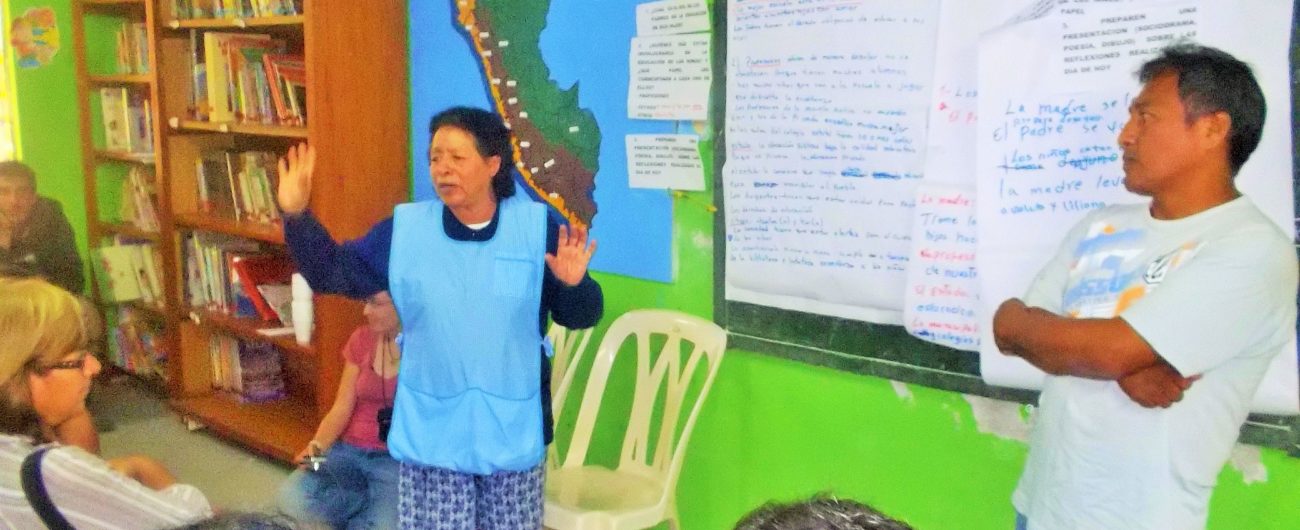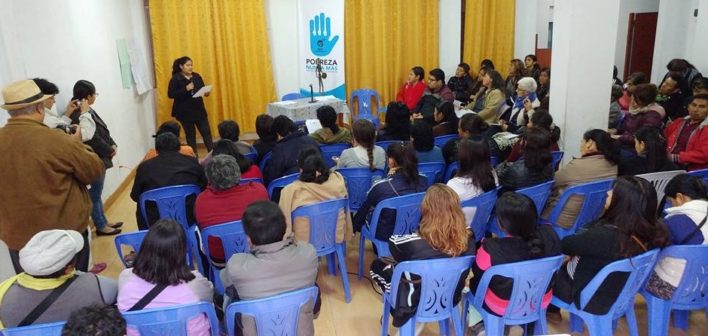Conversations Across the Social Spectrum: Peru’s “Reflection Circles”

Conversations Across the Social Spectrum in Peru
Since 2016, conversations focusing on the importance of joining forces to promote transformative social activism have been taking place in Lima, Peru. Established by ATD Fourth World, these discussion forums are called “Reflection Circles”. People living in situations of poverty and people from other background get together to share opinions and ideas about different global topics. The meetings serve to strengthen connections between community associations working in different ways to overcome extreme poverty in the Peruvian capital’s northern area.
Each Reflection Circle involves a month of workshops that take place prior to a concluding plenary session. The preparatory meetings allow participants and community groups to discuss experiences and explore ideas that they want to present to the guests invited to a public plenary session. These guests are often professionals or specialists with expertise in the chosen theme.
Reflection Circle on the role of parents as educators in the home, June 2017
The theme of the 2017 Reflection Circle was “Living without poverty and with dignity”. After the preparatory workshops, which finished in May, around 85 people met in the offices of the “Quijote para la Vida en Santa Rosa” organization for the plenary session, which focused on the role of parents as educators in the home. Attendees included fathers and mothers involved with five organizations: “Urpicha-Perú Construyendo Esperanza” from Año Nuevo in Comas; Hand by Hand from Los Jazmines, Puente Piedra; “Quijote Para la Vida” from Santa Rosa, Puente Piedra; Barrio Cinema with young producers from Ancón; and ATD Fourth World with members from Vista Alegre, Valdivieso and the Vizcachera Community in Huarochirí.
The community groups were joined by education professionals, education students from the University of Sapiencia, and additional students from the University of San Marcos. Special guests were educator and philosopher Alejandro Cussianovich and former Education Minister Gloria Helfer.
“It was very exciting to see fathers and mothers share their experiences, and their thoughts about their parenting style and how they act as educators of their own children. We all left very pleased and eager to get together again,” said Pilar Jordán, full time member of the ATD Volunteer Corps.
The depth of the conversations demonstrated how much people need to share their experiences with each other and to learn that other parents have the same questions, worries, and hopes with regards to their children. Likewise, the Reflection Circle showed how important it is for people living in poverty to interact with specialists and professionals who can communicate what they learn through these discussions to others in their field of work. Below are excerpts from the June meeting.
“At home, children learn values from a very young age. It’s important for parents to act as guides to our children and to show them how to avoid making mistakes. And also to tell them that we are human and that we make mistakes too. You have to explain that it’s OK to make mistakes and that they can learn from their mistakes.” Mónica Ramírez, Año Nuevo, Asociación Urpicha, Comas.
“Education begins at home. Now that we are fathers and mothers, we see that home is the most important school. The type of citizens that our children will become depends on how we treat them. No matter how busy we are, it’s essential to give children time and love. Then we’ll have good citizens who can continue to grow.”
Elena, Los Jazmines, Puente Piedra.
Groups involved in the preliminary workshops presented summaries of their discussions through a variety of engaging formats. The Urpicha asociation expressed their ideas in the form of a mural painting. The Hand by Hand association performed a play. ATD Fourth World presented a series of people’s stories about their life experiences. After these initial presentations, the invited guests gathered together all the contributions, and shared comments and questions. They also encouraged the parents at the meeting to continue to act as the primary educators of their children.
“To correct a child you need to choose the right moment and say the right words in the proper manner, whether you are a teacher, professor, or parent. Everyone is a teacher – everyone! We may not be teachers in a classroom, but we have the responsibility, the duty, to look carefully at all our relationships with children and to find, with them, an educational dimension,” said Alejandro Cussianovich, a philosopher and educator.
Gloria Helfer, Former Minister for Education emphasized the broader meaning of education. “What does it mean to teach?” she asked. “Teaching is the relationship between all human beings. To educate is to establish a human relationship, whether between parents and their children or teachers and their students. Human relationships are not just about transmitting knowledge, principles, values, or mathematics. There is also the question of what a child needs to become a complete person. On the one hand a teacher needs the intellect and on the other a breadth of feeling. Tenderness, hugs, being tucked into bed at night; these are the things that weave a relationship together and give someone the feeling of being loved.”
Additional information on ATD Fourth World’s work in Peru can be found here.


